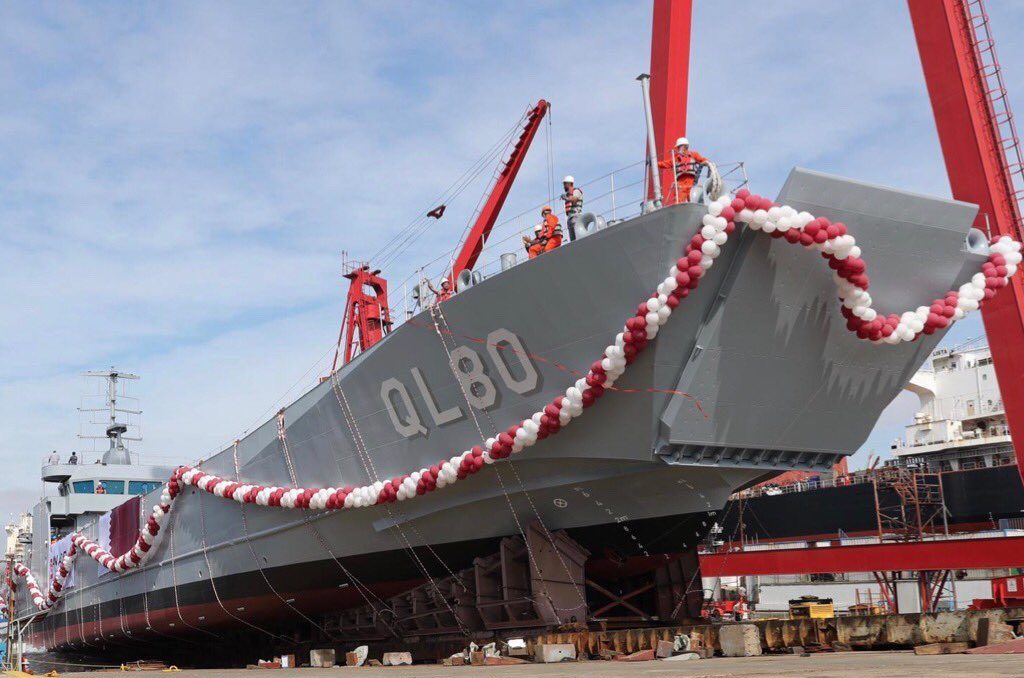The ship will feature an electrooptic system, a navigation radar equipped with WECDIS, and communication systems.
Qatar has inaugurated a new naval warship in Turkey, one of the Gulf nation’s strongest allies, in a new effort to strengthen ties, authorities have announced.
The “Al Abrar Fuwairit” (type LCT80) warship was unveiled on Saturday by Commander of the Qatari Amiri Naval Forces Major General (Navy) Abdullah bin Hassan Al Sulaiti, who was accompanied by Turkish Naval Forces Commander Admiral Adnan Özbal in Istanbul.
The Fuwarit is the first LCT built by a private Turkish shipyard that has been exported. It has an overall length of 80 meters and a beam of 11.7 meters.
Staffed by a total of 25 people, the ship will be armed with 30mm guns and two 12.7mm STAMP guns, both manufactured by Aselsan. According to Naval News, the ship will be capable of carrying three main battle tanks, as well as military vehicles of various types and sizes, or 260 fully equipped troops.
“The contract for this ship was signed in September of last year. The 12-month period has ended, and we are proceeding with the launch as planned today. We intend to complete all tests and training sessions over the next 24 months and deliver them to Qatar,” said Cevat Rifat Atilhan, CEO of Anadolu Shipyard.
The official stated that the warship will be used for various purposes, including personnel transfer, vehicle transfer, logistics operations, and humanitarian assistance.
“We have previously built and delivered eight of these types of vessels for the Turkish Naval Forces,” said Atilhan.
“We are building these ships with a local contribution of more than 70%. These LCTs are entirely original to us. As part of our current contract with Qatar, we are currently building two military training ships. We just delivered one a few weeks ago, and its trials are still ongoing.”
The ceremony was attended by several high officials from both countries, including Brigadier General Mohammed Rashid Al Awami, Qatar’s military attache in Ankara, senior officials of Barzan Holdings and Turkish Anadolu Shipyard Company.
The ship is expected to join Qatar’s Navy forces before the 2022 World Cup.
Qatar-Turkey relations
Both countries have been allies since 1972, with relations growing increasingly stronger in the past years, especially since Saudi Arabia, the United Arab Emirates, Bahrain and Egypt imposed an illegal blockade on Qatar in 2017.
In 2015, Turkey established a military base with around 3,000 troops in Qatar led by the Qatar-Turkey Combined Joint Force Command. The base was previously described by the the former blockading quartet as a “source of instability.”
In June, reports said Turkey was preparing to train Qatari fighter pilots and allow the temporary deployment of up to 36 Qatari military aircraft and 250 personnel, according to a document obtained by monitoring and news site Nordic Monitor.
President Recep Tayyip Erdogan forwarded a technical agreement, signed by Turkey and Qatar, to parliament for approval, the report said.
Qatar and Turkey hold at least 62 agreements that cover numerous sectors, including economy, military, safety, investment, energy, culture, intellectual property, education, and youth. During the past 12 months, the trade volume between Doha and Ankara has increased by 6%, reaching $1.6 billion.
Qatar’s total investments in Turkey have now reached $22 billion, with 533 Turkish companies operating in the Gulf country in numerous projects that are worth at least $18.5 billion. In turn, 179 Qatari companies currently operate in Turkey.
Qatar arms imports
Qatar’s arms imports have seen a 361% increase from 2016-to-2020, according to a report released by the Stockholm International Peace Research Institute.
In 2020, Qatar Armed Forces signed a deal worth more than $800 million with aerospace giant Boeing and major US defence contractor and industrial corporation Raytheon.
As a result Qatar received 36 F-15QA jets as part of the deal.
In September 2020, Qatar submitted a formal request to the United States to buy F-35 fighter jets. Israel reportedly opposed the purchases, saying that the deal would threaten Israel’s military presence in the region.
Follow Doha News on Twitter, Instagram, Facebook and Youtube







